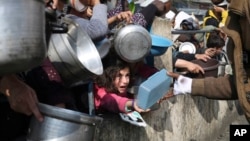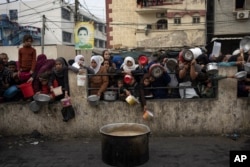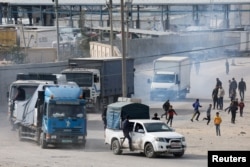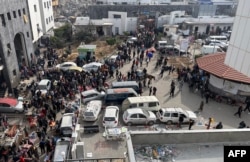United Nations agencies warn the Gaza Strip is slipping into an ever more disastrous situation as the Israel-Hamas war continues unabated and hundreds of thousands of people suffering from a chronic lack of food and water face an acute risk of famine.
"We have more than half a million people in Gaza facing catastrophic food insecurity levels. The risk of famine increases each day as the conflict limits the delivery of life-saving aid to people in need," said Abeer Etefa, World Food Program senior communications officer and spokesperson for the Middle East and North Africa.
Speaking to journalists in Geneva on Tuesday from Cairo, Etefa said WFP has procured 21,000 tons of food supplies from across the region — enough for around 2 million people inside Gaza for one month.
"The problem is that all the food is on the border outside in Egypt, but not yet inside Gaza."
Once this issue is resolved, she said, "The biggest challenge is how to move supplies inside Gaza to get it to areas that are out of reach." She said access and distributions were only possible in the south of Gaza, not in the north.
For the first time in six weeks, since a humanitarian pause allowed aid to get into Gaza, she said WFP recently was able to deliver 200 metric tons of food supplies for around 15,000 people in Gaza City.
Unfortunately, she said, "All areas north of Wadi Gaza [wetlands] have been extremely difficult to reach because of the restricted access to the area."
Israel has repeatedly said that humanitarian aid is entering Gaza but is being stolen by Hamas or is not being efficiently distributed. Israeli government spokesman Elon Levy said Tuesday there were "no limitations on the admission of humanitarian aid."
"International actors interested in seeing more aid in Gaza should send more," he said. "We still have a problem that U.N. agencies are unable to distribute the aid as quickly as Israel is processing it."
Etefa maintained that the threat of famine is a big fear, noting that a report by the Integrated Food Security and Nutrition Phase Classification has found devastating levels of food insecurity in Gaza.
"All the 2 million people in Gaza are in crisis … and almost a fourth of these people, or more than half a million people, are in the worst stage of hunger, which is IPC five, which means that people are starving."
She said virtually all Palestinians in Gaza are skipping meals every day while many adults go hungry so children can eat.
"We are seeing a very worrisome situation in terms of children's malnutrition. Of course, the shortage of water is making things worse because children get weaker with diarrhea. Pregnant women are not getting enough to eat, and this will impact the health of their babies when they are born," she said.
She noted that the shortage of food, clean water, and medical assistance is particularly severe in the northern areas, a situation confirmed by humanitarian workers in the area.
After several days of aborted missions, the World Health Organization reports that a convoy of much needed humanitarian supplies managed to enter northern Gaza on Monday.
WHO spokesperson Christian Lindmeier said one of the convoys, mainly carrying fuel, was prevented from reaching Al-Shifa hospital by a desperate mob of hungry people.
"The people were holding it up as multiple times it was trying to move forward and trying to leave and trying to get onto the road because they were so desperate looking for food," he said.
"The team on the ground had to convince them that there was only fuel. They had to show them that there was nothing to eat for them, nor food for anyone else."
He said the desperation seen on the ground also is apparent inside the hospital.
"We had grave reports of people who as they were waiting for surgeries were begging for water, begging for food," he said.
WFP spokeswoman Etefa said Gaza has "the largest concentration of people in what looks like famine-like conditions anywhere in the world," adding that it was alarming to see how quickly this has happened.
She said, "What is so concerning is to see how many months of conflict, of chaos" it has taken other countries "to get to this point."
She said places like Yemen, Syria, South Sudan, or Sudan have gone through years of conflict before reaching the high level of hunger that Gaza has reached in fewer than 100 days.
"The risks and stakes are very high," she said. "This is probably one of the conflicts that has the fastest deterioration rates in terms of food security."







